An Interview with John Joseph Adams
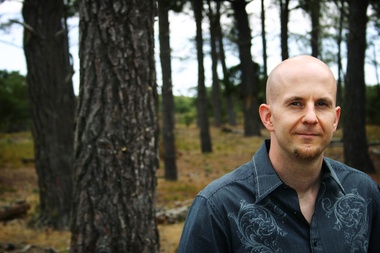
Nearly every fabulous anthology you’ve read in the past ten years was edited by John Joseph Adams.*
OK, OK, that might be a little much. I’ll restate. Nearly every fabulous anthology you’ve read in the past ten years was either edited by John Joseph Adams or Ellen Datlow. Cross my black heart and bet you a Tardis, that statement’s got sturdy stems.**
Today we focus on Mr. Adams – king taste-maker of spec fic. He’s been a six-time finalist for the Hugo Award and a four-time nominee for the World Fantasy Award. When he isn’t busy creating anthologies and being lauded for them, the man publishes Lightspeed and Nightmare magazines. Don’t forget about that podcast he does for Wired, The Geek’s Guide to the Galaxy. Dude’s busy.
Black Gate honey-badgered our way into a talk with John Joseph Adams about his process and his anthology, The Mad Scientist’s Guide to World Domination. If you haven’t read it, what are you waiting for? Mad scientist stories by the likes of Austin Grossman, Seanan McGuire, David D. Levine, Carrie Vaughn, Naomi Novik, and Theodora Goss? YES, PLEASE! Seriously, the table of contents is next level, ninja. And have you eyed that COVER? It guts you with glass-tubed-screaming-creature awesome. Go buy it. We can wait.
::pauses::
Did you get the e-book or the book-book? All I’m saying is if you read the e-book, I can’t see that you are reading the e-book and then can’t saunter up to you in the coffee shop and be your new best friend.
Anyways, here be Black Gate’s talk with John Joseph Adams.
Black Gate: What is your process to ensure you are creating a diverse selection of [stories] for each anthology you create?
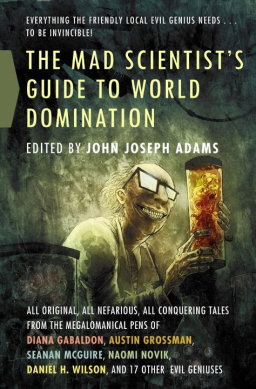 John Joseph Adams: For an original anthology, I start by inviting a diverse selection of authors; I think about the people who seem like obvious fits given the theme, and then I try to think outside that box and come up with authors who might enjoy writing for the theme but are not necessarily the people you would expect to appear in such an anthology.
John Joseph Adams: For an original anthology, I start by inviting a diverse selection of authors; I think about the people who seem like obvious fits given the theme, and then I try to think outside that box and come up with authors who might enjoy writing for the theme but are not necessarily the people you would expect to appear in such an anthology.
Then, to help ensure that the stories themselves are diverse takes on the theme, I typically ask the authors to send me a little one or two sentence pitch for their story, just so I have some idea what they’ll be working on – that way if two people end up coming up with something that seems overly similar, I can encourage one or the other to take it in a different direction sooner rather than later.
For a reprint anthology, the process is a bit simpler (though often more time-consuming), since basically you just try to read everything and then whittle it down to just the best. In the process of doing so, you can make note of the kinds of authors and stories you’re filling the book with and adjust accordingly if you end up with too much of one thing and not enough of another. To help me find a wide variety, after I announce the project I typically ask for reader and colleague suggestions, in addition to doing my own research.
While you are creating an anthology, how do you decide what order to put stories in?
That’s definitely more of an art than a science and, as a result, is kind of hard to explain the method to my madness. Essentially I do it by feel; I want there to be a certain flow to the anthology, and everything I do is an attempt to achieve that flow. I like to lead off and end the book with two of the strongest stories (with the final story also ideally providing a lot of emotional impact that will resonate with the reader long after they put down the book). I also tend to put one of the other strongest stories somewhere around the middle of the book – what I think of a “tentpole” story. With those three in place, I then go about trying to achieve my desired flow. I think about each story and what it would be like to read that story and then to read the story after that, and so on. Another factor is story length; I find that it’s usually best for the flow of the anthology if you don’t clump too many long stories together, so in my spreadsheet where I have all the stories listed, I have all their word counts there so I can see that as I’m sorting the contents out, and I try to balance out longer stories by running shorter ones afterward. Speaking of my spreadsheet, that’s what I use to actually figure out the order. I just have a column for the table of contents order, and in that column I put a number for the “slot” that story is slated for, that way I can sort the spreadsheet and have it thus put the stories in TOC order.
What guidelines did you give yourself on what sort of stories to select for this anthology?
I started off thinking that I wanted to keep the book very strictly on-theme so as to avoid the title being misleading in any way. So I gave the authors very specific instructions that their stories should all be specifically from the POV of the mad scientist/evil genius or that of someone in their organization, etc. (i.e., not from the POV of someone trying to stop them). But as the stories started coming in, some of the authors went in a different direction, and ultimately I think that the book is better for it; there is a high percentage of stories in the anthology that do in fact tell the story from the mad scientist POV, but I think having some stories that don’t adds a nice bit of variety to the book that it wouldn’t have had otherwise.
Is there one type of mad scientist story you are sick of?
Not really. The mad scientist trope is a really fun one, and I think there are lots of different ways you can explore it and make even the most familiar iterations of it feel fresh and amusing.
You also edit Lightspeed and Nightmare magazines. How is selection and editing for a magazine different than for an anthology?
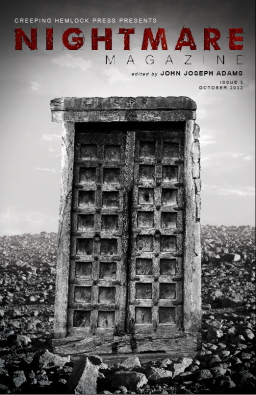 You have to worry about a lot of the same things, in terms of diversity of contributors and contents, but it’s a much more open process than with an anthology, which will have a lot of restrictions placed upon it. With an anthology, you’ve got a word count restriction for the overall book; you’ve (usually) got a thematic restriction; (depending on your publisher) you’ve probably got an obligation to include a certain number of “big name” authors in your book…
You have to worry about a lot of the same things, in terms of diversity of contributors and contents, but it’s a much more open process than with an anthology, which will have a lot of restrictions placed upon it. With an anthology, you’ve got a word count restriction for the overall book; you’ve (usually) got a thematic restriction; (depending on your publisher) you’ve probably got an obligation to include a certain number of “big name” authors in your book…
With a magazine, you don’t have any of that, really. Thematically, obviously, a magazine is almost entirely open, except for the general genre guidelines you lay out (i.e., SF/Fantasy for Lightspeed, horror/dark fantasy for Nightmare). With a magazine, if you keep an inventory of material as I do, you don’t have a word count restriction either, since you’re not filling issues, you’re just buying good stories as they come in and storing them until you’re ready to publish them. And as for big names…of course when you’re publishing a magazine you’d love to have stories by prominent authors grace your pages, but it’s much less important than it is in an anthology – I think that is probably largely because people who like short stories enough to read short fiction magazines are not as likely to care as much about who is doing the writing as much as they are trusting the editor to present them with good stories; whereas anthologies have to appeal to a wider demographic, and thus they need more prominent authors in the mix to help lure those more casual (short fiction) readers into buying the book. Because of all that, to me, editing a short fiction magazine feels like the purest form of editing.
Yes, we know, they are all your favorites, but if you had to pick…what are your favorite favorite stories in The Mad Scientist’s Guide to World Domination?
Well, you can infer from my earlier comments that Austin Grossman’s and Ben Winters’s stories were among my favorites, since I placed them first and last in the anthology. Jeremiah Tolbert’s story (one of the reprints in the book) was one of my primary inspirations for the book, so that’s a favorite. Otherwise, I’d just note that via a couple of different publishing ventures – which didn’t work out for one reason or another – I’ve been trying to publish Marjorie Liu’s story for many years now, so that one feels like an old friend, and I’m glad to be able to finally bring it to light. David Levine’s “Letter to the Editor” is another favorite – especially if you hear him read it aloud himself. It was probably one of my favorites already, but once I heard him read it at a convention it made me like it even more. (You can actually watch or listen to David reading the story online.)
If you were a mad scientist, would you be the stained lab coat, mismatched shoes type or the sleek academic?
I would probably attempt to be the sleek academic but would end up more like the guy in the stained lab coat with mismatched shoes.
What would be your mad scientist specialty?
Editing anthologies, obviously! Though I would say it’s more of an art than a science. Maybe I could be a mad artist. On the other hand, although my Bachelor’s degree in English is technically a B.A., a lot of people consider it a BS degree. So maybe a career in the arts is actually the maddest kind of science there is. Or something.
I think maybe Paul Goat Allen missed the mark when he called me “the reigning king of the anthology world”; clearly what he should have said was “the mad scientist who has dominated the anthology world” or something like that. If he didn’t so consistently give me such glowing reviews I would have him disintegrated immediately for that insolence.
Would you want a sidekick/lab assistant or would you be a solo lunatic?
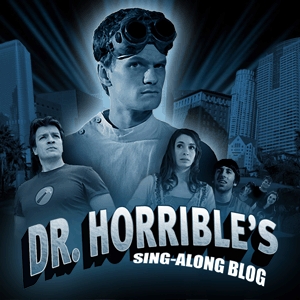 Take a look at the About Our Staff pages on Lightspeed and Nightmare and astound at the list of (volunteer!) staff I have working at the magazines. Given all those helpers I currently have, what do you think? (And that doesn’t even list all our many slush readers!)
Take a look at the About Our Staff pages on Lightspeed and Nightmare and astound at the list of (volunteer!) staff I have working at the magazines. Given all those helpers I currently have, what do you think? (And that doesn’t even list all our many slush readers!)
Hit us up with your favorite mad scientist film.
I’d have to go with Dr. Horrible’s Sing-Along Blog. As it happens, I conceived of the anthology before Dr. Horrible came out, but publishing is a slow process – sometimes an extremely slow process – and so the anthology didn’t end up coming out until long after that debuted. I also owe it a debt, though, as its surprise success probably helped me sell the anthology in the first place, so that was just great timing for me. (Thanks, Joss!) You asked about film, not TV, I realize – I think of Dr. Horrible as more of a film than a TV miniseries, even though that’s how it was presented – but if I were to name my favorite mad scientist TV show I’d have to go with The Venture Bros., and that was another important inspiration to me in doing the book.
What about your favorite mad scientist in fiction?
Is it a cheat if I name a real mad scientist who has frequently been depicted in fiction instead? If not, then I would say Nikola Tesla, because, seriously, how awesome was that guy? If I had to pick an actual fictional person, though, from fiction as opposed to TV/film, I guess I’d have to go with the original, Dr. Frankenstein. Leaving aside, of course, all of the excellent mad scientists that appear in the pages of my book, all of whom are vastly, VASTLY superior to both Tesla and Frankenstein.
Why do you think so many mad scientists are cast in fiction and film as male? Do you think this will change anytime soon?
That’s a good question, but yes I would expect it to change sometime soon. Maybe if something like the Girl Genius comics are adapted to film, that’ll change things, or something Seanan McGuire writes (or has written) maybe. (When I think of female mad scientist, I just imagine Seanan in a lab coat smiling gleefully with a petri dish of some horrible virus in her hand.)
Who are your editor heroes?
First and foremost, Gordon Van Gelder at The Magazine of Fantasy & Science Fiction was my mentor, and gave me my start in the industry, so he’ll always be an editorial hero of mine. I learned so much from him that I can never adequately thank him for all that he taught me.
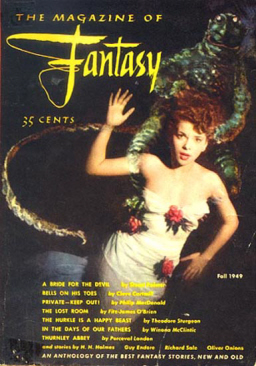 Ellen Datlow also provided some editorial tutelage, particularly in regard to putting together anthologies and anthology proposals. But aside from that, she’d long been a favorite editor of mine, and the fact that I can count her as a friend is one of those really surreal things about my life.
Ellen Datlow also provided some editorial tutelage, particularly in regard to putting together anthologies and anthology proposals. But aside from that, she’d long been a favorite editor of mine, and the fact that I can count her as a friend is one of those really surreal things about my life.
Then there’s folks like David Hartwell, whose retrospective anthologies like The Dark Descent and The Hard SF Renaissance helped set the standard for such books. And there’s Gardner Dozois – I would wager that of all the books in my house, his name graces the spine of the largest percentage of them of any author/editor.
There’s Ben Bova, who was probably the first short fiction editor I was ever aware of; I discovered him as a writer but then learned of Analog because of his introductions and commentary in his collections.
Other than Ellen, in the realm of horror there’s Stephen Jones for his long-running Year’s Best anthologies, and there’s Kirby McCauley for his influential books like Dark Forces. More than anything, though, Charles Grant’s Shadows series – and his idea of “quiet horror” – is what most has shaped the kind of magazine Nightmare is.
Of course, any anthology editor owes a debt to Harlan Ellison because of his Dangerous Visions anthologies, along with other seminal folks like Damon Knight, Terry Carr, Robert Silverberg, Judith Merrill, Groff Conklin… And then of course there’s all the great magazine editors, like John W. Campbell and Ed Ferman and Horace Gold, etc., etc. I’d better stop here otherwise we might be here all day.
If you had to publish a themed anthology outside of sci-fi and fantasy, what would be its theme?
I’d say the most likely non-SF/fantasy anthology I might do some day would be a mystery/crime type of thing; I’m really interested in crime fiction – my favorite TV show is The Wire, for instance, and I’m currently really enjoying Southland – and I came of age reading mysteries and thrillers. I also read a lot of medical thrillers growing up, so possibly something like that.
I actually did put together a proposal for a crime anthology within the last couple of years, something that I thought was a really good concept, but also with a strong social commentary aspect that made it feel very relevant, and also was geared to at least partially be a charity project. So I drew up my list of contributors, mostly of notable/bestselling authors in the mystery/crime field…but not a single author I approached about it said yes. I saw this societal injustice, and I thought, well, what can I do about it? I figured the best way for me personally to try to make social change is through my art. And I thought: these mystery and crime writers, they write about this kind of injustice all the time in one form or another, surely they would get behind a project that sought to explore and humanize the victims of this injustice, surely they would get behind a book whose proceeds would go help benefit the victims. But no – not a single author gave me even a maybe. That was…disheartening, to say the least.
What was the societal injustice you were interested in creating a crime anthology around?
I guess there’s no harm in saying since the project never went anywhere and isn’t likely to. Here’s a bit about it from my pitch to authors:
On September 21, 2011, people of good conscience all over the world stood vigil as Troy Davis was put to death for a crime he may not have committed. In the absence of a shred of physical evidence, with seven of nine witnesses recanting their testimony, and accounts of a confession from one of the remaining two, the death penalty was still carried out. On that grim day protesters carried signs that read “I am Troy Davis”-a reminder that our justice system is far from infallible, and that any one of us could find ourselves in the same position, accused of the worst possible crime, without the resources to prove our innocence.
We may never know whether Troy Davis committed the crime that he died for, and that burden of doubt weighs on people today. What we do know is that since 1989, 250 people convicted of violent crimes have been exonerated through post-conviction DNA testing.
The idea for this anthology is that the stories would focus on those affected by wrongful conviction-be it the convict, their family, the people working to exonerate them, or perhaps even the family of the victim, faced with the terrible truth that the authorities have the wrong man.
Since 1992 the Innocence Project has been dedicated to exonerating wrongfully convicted people through DNA testing and reforming the criminal justice system to prevent future injustice. This not-for-profit entity works tirelessly on behalf of those who have run out of options, and provides much-needed services for those who find themselves finally innocent, free, and still without support or resources. I had planned for the anthology to serve as a charity fundraiser to benefit The Innocence Project and support them in their fight for true justice. (I should note that I left it up to the contributors whether or not their proceeds would be donated, and had planned on paying them up front for their stories, so lack of payment can’t be the reason why everyone said no.)
Who are the writers you are dying to work with?
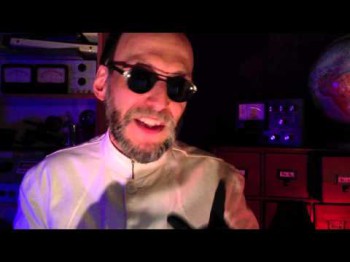 Most of the writers I’d be dying to work with, I already have worked with in some capacity if you count reprinting their work as “working with them.” But as far as working with them on original projects, I’d certainly love to do something with Stephen King, Neil Gaiman, Joe Hill, Kelly Link, Karen Russell, and Junot Diaz, just to name a few people off the top of my head. But there are so many super talented writers out there that I haven’t gotten the chance to publish yet, so such a list could go on and on.
Most of the writers I’d be dying to work with, I already have worked with in some capacity if you count reprinting their work as “working with them.” But as far as working with them on original projects, I’d certainly love to do something with Stephen King, Neil Gaiman, Joe Hill, Kelly Link, Karen Russell, and Junot Diaz, just to name a few people off the top of my head. But there are so many super talented writers out there that I haven’t gotten the chance to publish yet, so such a list could go on and on.
For more information on John Joseph Adams, check out his blog and twitter. You can also click here for author interviews and other extras pertaining to The Mad Scientist’s Guide to World Domination.
*This being the humble opinion of I, the Dread Templeton – not all of Black Gate.
**Yes, I acknowledge there are other fabulous editors out there, but these are my favorites. Maybe my next post will be “The Super Raddest Spec Fic Editors Out There” and it’ll include the likes of John Klima, Ann and Jeff VanderMeer, Mort Castle, and more.
Patty, I can certainly see you slamming the door on me as a anthology editor, but Lou Anders as well? Shame! 😉
I was just playing my top two favorites. 0.0!
Maybe that’ll be my next post:
THE TOP TEN BEST DANG EDITORS OUT THERE!
Love it! 🙂
Masked was a heckuva good read, too…now that I think about it.
[…] An Interview with John Joseph Adams […]
[…] actually just answered this in an interview recently, so I hope you don’t mind me copying and pasting that […]